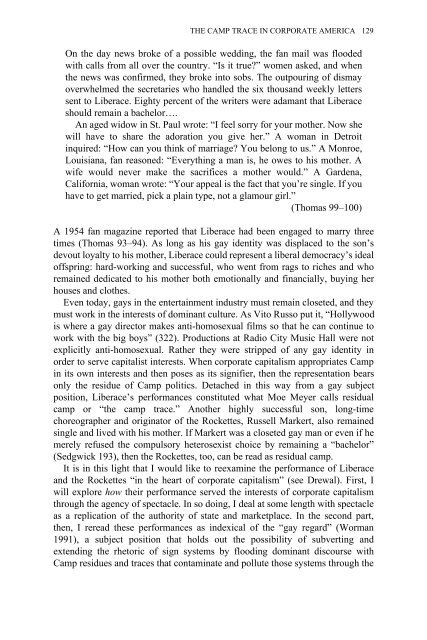Edited by Moe Meyer - Get a Free Blog
Edited by Moe Meyer - Get a Free Blog
Edited by Moe Meyer - Get a Free Blog
You also want an ePaper? Increase the reach of your titles
YUMPU automatically turns print PDFs into web optimized ePapers that Google loves.
THE CAMP TRACE IN CORPORATE AMERICA 129<br />
On the day news broke of a possible wedding, the fan mail was flooded<br />
with calls from all over the country. “Is it true?” women asked, and when<br />
the news was confirmed, they broke into sobs. The outpouring of dismay<br />
overwhelmed the secretaries who handled the six thousand weekly letters<br />
sent to Liberace. Eighty percent of the writers were adamant that Liberace<br />
should remain a bachelor….<br />
An aged widow in St. Paul wrote: “I feel sorry for your mother. Now she<br />
will have to share the adoration you give her.” A woman in Detroit<br />
inquired: “How can you think of marriage? You belong to us.” A Monroe,<br />
Louisiana, fan reasoned: “Everything a man is, he owes to his mother. A<br />
wife would never make the sacrifices a mother would.” A Gardena,<br />
California, woman wrote: “Your appeal is the fact that you’re single. If you<br />
have to get married, pick a plain type, not a glamour girl.”<br />
(Thomas 99–100)<br />
A 1954 fan magazine reported that Liberace had been engaged to marry three<br />
times (Thomas 93–94). As long as his gay identity was displaced to the son’s<br />
devout loyalty to his mother, Liberace could represent a liberal democracy’s ideal<br />
offspring: hard-working and successful, who went from rags to riches and who<br />
remained dedicated to his mother both emotionally and financially, buying her<br />
houses and clothes.<br />
Even today, gays in the entertainment industry must remain closeted, and they<br />
must work in the interests of dominant culture. As Vito Russo put it, “Hollywood<br />
is where a gay director makes anti-homosexual films so that he can continue to<br />
work with the big boys” (322). Productions at Radio City Music Hall were not<br />
explicitly anti-homosexual. Rather they were stripped of any gay identity in<br />
order to serve capitalist interests. When corporate capitalism appropriates Camp<br />
in its own interests and then poses as its signifier, then the representation bears<br />
only the residue of Camp politics. Detached in this way from a gay subject<br />
position, Liberace’s performances constituted what <strong>Moe</strong> <strong>Meyer</strong> calls residual<br />
camp or “the camp trace.” Another highly successful son, long-time<br />
choreographer and originator of the Rockettes, Russell Markert, also remained<br />
single and lived with his mother. If Markert was a closeted gay man or even if he<br />
merely refused the compulsory heterosexist choice <strong>by</strong> remaining a “bachelor”<br />
(Sedgwick 193), then the Rockettes, too, can be read as residual camp.<br />
It is in this light that I would like to reexamine the performance of Liberace<br />
and the Rockettes “in the heart of corporate capitalism” (see Drewal). First, I<br />
will explore how their performance served the interests of corporate capitalism<br />
through the agency of spectacle. In so doing, I deal at some length with spectacle<br />
as a replication of the authority of state and marketplace. In the second part,<br />
then, I reread these performances as indexical of the “gay regard” (Worman<br />
1991), a subject position that holds out the possibility of subverting and<br />
extending the rhetoric of sign systems <strong>by</strong> flooding dominant discourse with<br />
Camp residues and traces that contaminate and pollute those systems through the


